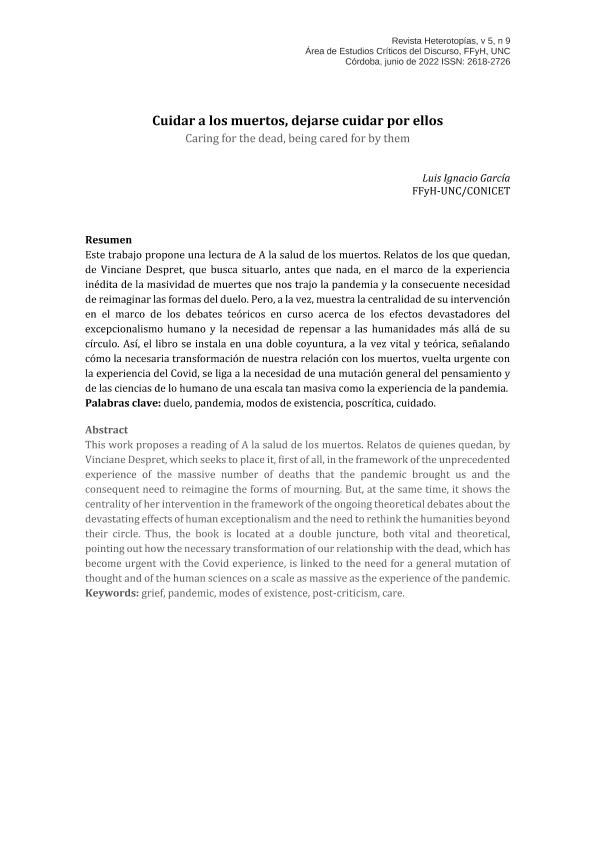Mostrar el registro sencillo del ítem
dc.contributor.author
Garcia Garcia, Luis Ignacio

dc.date.available
2023-07-10T13:56:40Z
dc.date.issued
2022-06
dc.identifier.citation
Garcia Garcia, Luis Ignacio; Cuidar a los muertos, dejarse cuidar por ellos; Universidad Nacional de Córdoba. Facultad de Filosofía y Humanidades. Escuela de Letras. Área de Estudios del Discurso; Heterotopías; 5; 9; 6-2022; 1-16
dc.identifier.uri
http://hdl.handle.net/11336/202921
dc.description.abstract
Este trabajo propone una lectura de A la salud de los muertos. Relatos de los que quedan, de Vinciane Despret, que busca situarlo, antes que nada, en el marco de la experiencia inédita de la masividad de muertes que nos trajo la pandemia y la consecuente necesidad de reimaginar las formas del duelo. Pero, a la vez, muestra la centralidad de su intervención en el marco de los debates teóricos en curso acerca de los efectos devastadores del excepcionalismo humano y la necesidad de repensar a las humanidades más allá de su círculo. Así, el libro se instala en una doble coyuntura, a la vez vital y teórica, señalando cómo la necesaria transformación de nuestra relación con los muertos, vuelta urgente con la experiencia del Covid, se liga a la necesidad de una mutación general del pensamiento y de las ciencias de lo humano de una escala tan masiva como la experiencia de la pandemia.
dc.description.abstract
This work proposes a reading of A la salud de los muertos. Relatos de quienes quedan, by Vinciane Despret, which seeks to place it, first of all, in the framework of the unprecedented experience of the massive number of deaths that the pandemic brought us and the consequent need to reimagine the forms of mourning. But, at the same time, it shows the centrality of her intervention in the framework of the ongoing theoretical debates about the devastating effects of human exceptionalism and the need to rethink the humanities beyond their circle. Thus, the book is located at a double juncture, both vital and theoretical, pointing out how the necessary transformation of our relationship with the dead, which has become urgent with the Covid experience, is linked to the need for a general mutation of thought and of the human sciences on a scale as massive as the experience of the pandemic.
dc.format
application/pdf
dc.language.iso
spa
dc.publisher
Universidad Nacional de Córdoba. Facultad de Filosofía y Humanidades. Escuela de Letras. Área de Estudios del Discurso
dc.rights
info:eu-repo/semantics/openAccess
dc.rights.uri
https://creativecommons.org/licenses/by-nc-sa/2.5/ar/
dc.subject
DUELO
dc.subject
PANDEMIA
dc.subject
MODOS DE EXISTENCIA
dc.subject
POSCRÍTICA
dc.subject
CUIDADO
dc.subject.classification
Filosofía, Historia y Filosofía de la Ciencia y la Tecnología

dc.subject.classification
Filosofía, Ética y Religión

dc.subject.classification
HUMANIDADES

dc.title
Cuidar a los muertos, dejarse cuidar por ellos
dc.title
Caring for the dead, being cared for by them
dc.type
info:eu-repo/semantics/article
dc.type
info:ar-repo/semantics/artículo
dc.type
info:eu-repo/semantics/publishedVersion
dc.date.updated
2023-06-30T10:49:18Z
dc.identifier.eissn
2618-2726
dc.journal.volume
5
dc.journal.number
9
dc.journal.pagination
1-16
dc.journal.pais
Argentina

dc.journal.ciudad
Córdoba
dc.description.fil
Fil: Garcia Garcia, Luis Ignacio. Consejo Nacional de Investigaciones Científicas y Técnicas. Centro Científico Tecnológico Conicet - Córdoba. Instituto de Humanidades. Universidad Nacional de Córdoba. Instituto de Humanidades; Argentina. Universidad Nacional de Córdoba; Argentina
dc.journal.title
Heterotopías
dc.relation.alternativeid
info:eu-repo/semantics/altIdentifier/url/https://revistas.unc.edu.ar/index.php/heterotopias/article/view/38146
Archivos asociados
